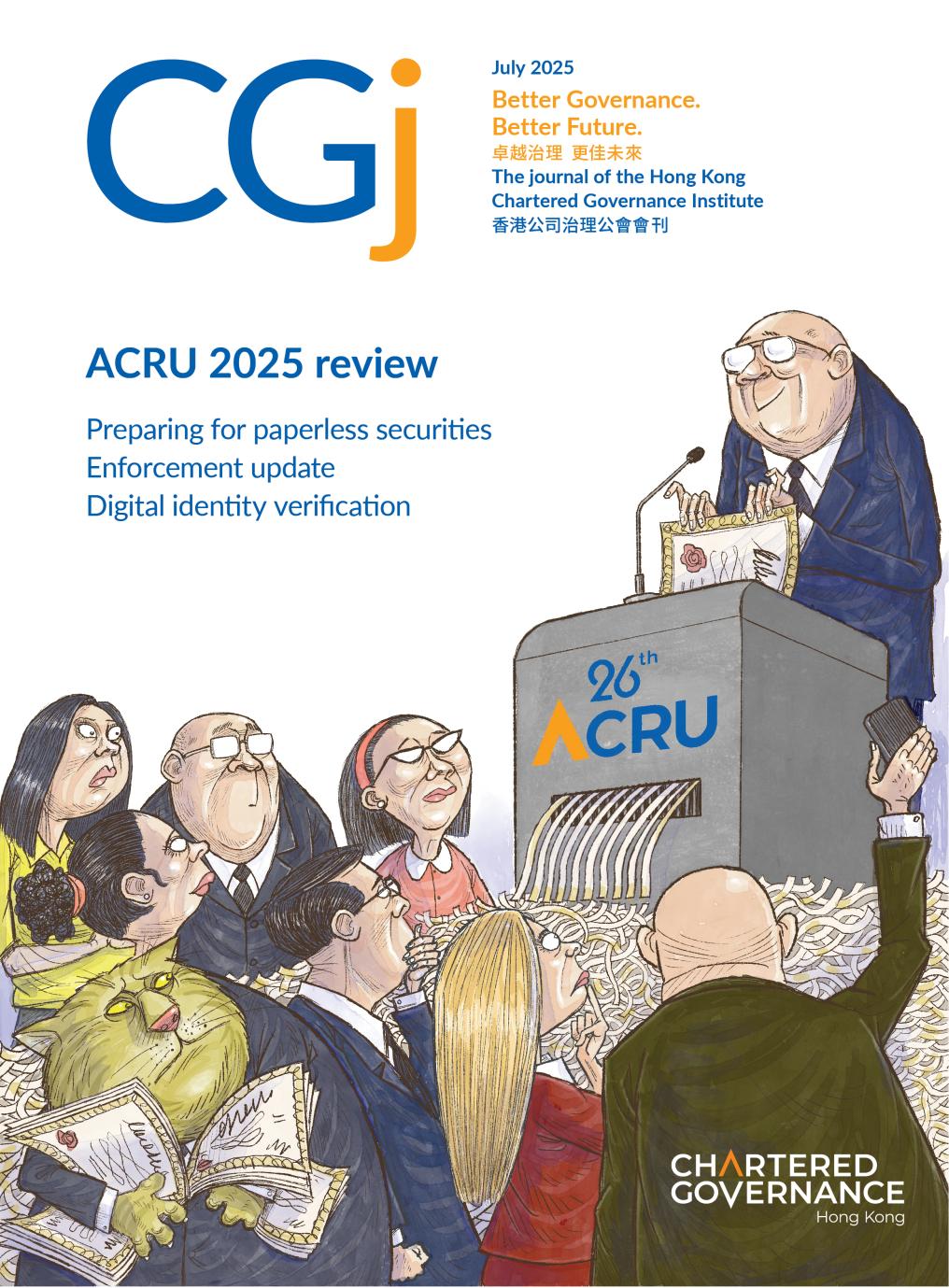
Building trust and transparency in the digital age
This third and final part of the CGj review of ACRU 2025 highlights the pivotal trends in relation to how company law reforms, anti-corruption initiatives and digital identity verification innovations are designed to modernise governance and strengthen corporate accountability.
Highlights
- legislative updates to the Companies Ordinance, including the introduction of the treasury share regime, the company redomiciliation regime and paperless corporate communication, will help Hong Kong stay competitive and agile
- the ICAC’s integrity compliance management system sets a clear framework for companies to embed ethical values and anti-corruption safeguards in their operations
- CorpID will streamline the corporate identity authentication process, reduce administrative burdens and empower governance professionals in both the public and private sectors
Reforms in company law and registry operations, alongside enhanced integrity management measures and digital verification tools, are reinforcing Hong Kong’s governance infrastructure for the digital era. This article summarises the key takeaways from the forum in relation to how these developments are shaping the future of compliance and trust in Hong Kong’s evolving regulatory landscape.
Legislative updates to the Companies Ordinance
In her presentation, Carol Hau, Solicitor (Company Law Reform), Companies Registry, provided a useful introduction to three legislative reforms – paperless corporate communication, the treasury share regime and the company redomiciliation regime.
Moving to paperless corporate communications
The Companies (Amendment) (No 1) Ordinance 2025, effective from 17 April 2025, introduced, among others, an implied consent mechanism for the dissemination of corporate communications by means of a website. This move is closely aligned with the paperless listing initiative of The Stock Exchange of Hong Kong Limited (the Exchange).
Under the revised framework, companies can use their websites as the default channel for corporate communications, if their articles of association contain a provision permitting the dissemination of corporate communications by means of a website and if a first-time notification of the new arrangements has been sent to each of their shareholders.
Shareholders are entitled to request a hard copy or an electronic copy of the documents at no cost, Ms Hau clarified. The objective is to reduce unnecessary paper usage and provide greater flexibility for companies when communicating with their shareholders, while preserving investor rights.
Enabling treasury shares
One of the most anticipated aspects of Hong Kong’s latest company law reforms is the introduction of the treasury share regime allowing listed companies to hold repurchased shares in treasury instead of cancelling them upon buy-back. This reform aligns the Companies Ordinance (CO) with amendments to the Listing Rules that came into effect in June 2024.
‘In the past, all repurchased shares had to be cancelled upon buy-back to guard against the risk of market manipulation by companies repeatedly buying back and reselling their own shares on the market,’ Ms Hau explained. ‘But with the strengthened regulatory framework under the Securities and Futures Ordinance, and the additional safeguards under the amended Listing Rules, we believe it is the right time to introduce the treasury share regime for listed companies to provide them with greater flexibility in managing their capital.’
Ms Hau also highlighted the key features of the treasury share regime, including:
- the sale and transfer of treasury shares are subject to requirements similar to those for the allotment of new shares
- all rights attached to treasury shares are suspended, except for the right to allot fully paid bonus shares, and
- the exclusion of treasury shares when calculating the relevant thresholds for various corporate matters.
Hong Kong’s new inward redomiciliation regime
Another significant company law reform discussed by Ms Hau was Hong Kong’s new inward company redomiciliation regime under the Companies (Amendment) (No 2) Ordinance 2025, effective from 23 May 2025. ‘This regime allows eligible non–Hong Kong companies to change their domicile to Hong Kong without winding up the overseas company and reincorporating a new Hong Kong company, or undergoing complicated and costly court-sanctioned schemes to convert into a wholly owned subsidiary of a Hong Kong company,’ Ms Hau said. ‘Now, with this new regime, they can redomicile to Hong Kong while preserving their legal identity and operational continuity. In addition, their assets and contractual obligations will not be affected.’
The redomiciliation regime is open to both private and public companies with a share capital, and covers jurisdictions whose legal frameworks allow outward redomiciliation. Applicants must demonstrate compliance with the requirements relating to, among others, integrity, solvency, and member and creditor protections. ‘This new redomiciliation pathway will help attract overseas companies that are largely operating in Hong Kong, particularly those in the insurance sector, to redomicile to Hong Kong,’ Ms Hau said.
Once registered, a redomiciled company will generally be regarded as a company incorporated in Hong Kong and is required to comply with all relevant filing and disclosure obligations under the CO, in the same manner as a company formed and registered under the CO.
Following Ms Hau’s presentation, a Q&A session was held to address questions from the audience on the above legislative updates. Karen Chan, Deputy Registry Manager (Company Formation & Deregistration), and Mendy Lam, Assistant Registry Manager (Registration), both from the Companies Registry, contributed their insights and clarified technical and procedural aspects relating to the implementation of the new regimes.
Improving governance through integrity management
The foundational role of ethics and integrity in sustaining good governance has been a major theme promoted by both the Institute and the Independent Commission Against Corruption (ICAC). ACRU attendees received insights into the rising relevancy of integrity management amid today’s evolving global regulatory landscape and the momentum of ESG-driven investments, as well as the latest updates on the importance of public– private partnership in enhancing corruption prevention awareness and capabilities, and a very practical introduction to how organisations can ensure effective integrity management by adopting the ICAC’s integrity compliance management system (ICMS).
Ricky Lai, Assistant Director, Corruption Prevention Department, ICAC, stressed that integrity must be embedded in the organisational culture, starting with leadership. Setting the tone from the top, he said, is essential to fostering ethical business practices, managing risks and maintaining public trust.
However, organisations should never stop there – integrity management is also about having a structured and comprehensive system in place to ensure that ethical standards and adequate controls are maintained. ‘Integrity is not just a buzzword, it is the cornerstone of trust, accountability and sustainable business growth,’ Mr Lai said.
“Integrity is not just a buzzword, it is the cornerstone of trust, accountability and sustainable business growth.”
Ricky Lai
Assistant Director, Corruption Prevention Department, Independent Commission Against Corruption
Five core components of the ICMS
Mr Lai highlighted the five core components of the ICMS.
- Integrity policy and code of conduct. These formalise the organisation’s top-level commitment to adopting ethical and anti-corruption business practices, a high standard of integrity and zero tolerance of corruption, as well as clearly setting out specific integrity and conduct standards.
- Integrity capacity and culture building. This provides integrity capacity-building training to directors and staff, and facilitates the embedding of integrity into corporate culture and the engagement of external stakeholders (such as regulators, anti-corruption agencies, industry peers and business counterparts) to conduct capacity building, share best practices and collectively combat corruption.
- Integrity risk management. This sets out a framework to regularly identify and assess integrity and corruption-related risks of various business functions and operations, as well as the controls for mitigating the risks, and to monitor control implementation.
- Corruption detection and reporting mechanism. This establishes clear procedures for reporting corruption, as well as for reminding relevant personnel to duly handle each report received and refer any alleged or suspected corrupt practices to the ICAC as soon as possible.
- ICMS audit. This ensures a periodic and structured assessment of how well the above four components are being implemented, and helps corporations improve their effectiveness.
A comprehensive ICMS guide is set to launch in 2026 to help listed companies unlock ICMS’s full value. Notably, the Exchange’s updated Corporate Governance Guide for Boards and Directors, issued in May 2025, encourages listed issuers to adopt the ICMS as part of their governance structure.
In closing, Mr Lai encouraged governance professionals to play an active role in fostering corporate integrity management and staying tuned for updates on ICMS. ‘Governance always begins with integrity and governance can only thrive if a robust integrity compliance management system is in place,’ he said.
A new era of e-governance
Turning to digital innovation, Ken Siu, Chief Systems Manager, Data Platforms, Digital Policy Office, introduced the government’s upcoming Digital Corporate Identity (CorpID) Platform at the forum. The CorpID initiative is aimed at streamlining corporate identity authentication and advancing Hong Kong’s digital economy.
Mr Siu began by highlighting the limitations of the current paper-based system for verifying corporate identity and authorising transactions. Corporations are often required to repeatedly submit business registration certificates, incorporation forms and identity documents across multiple platforms and transactions. This redundancy, he noted, creates operational inefficiencies and increases compliance costs. ‘CorpID will enable secure, efficient and legally recognised identity and signature verification for government-to-business (G2B) and business-to-business (B2B) transactions,’ he said.
CorpID will act as a unified digital key for businesses, functioning like a digital company chop or corporate smart ID. Once implemented, corporations will be able to authenticate themselves digitally and execute transactions using digital signatures with legal equivalence to handwritten ones. The platform will also support delegated authority, allowing directors or authorised officers to grant rights to employees to act on behalf of the company in specific transactions.
The rollout of CorpID will begin at the end of 2026. The government estimates that around 1.8 million corporations will be eligible to participate in the first phase.
Mr Siu emphasised that CorpID will not only reduce paperwork and verification redundancies, but will also improve trust and efficiency across Hong Kong’s public and private sectors. ‘CorpID is designed to empower company secretaries and governance professionals by reducing administrative burdens and enabling more strategic work,’ he said.


